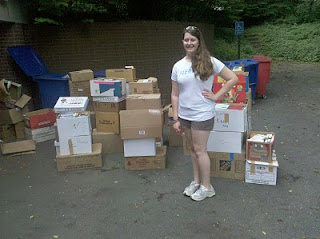The Medium Is the MediumBy DAVID BROOKS
The New York Times
Published: July 8, 2010
Recently, book publishers got some good news. Researchers gave 852 disadvantaged students 12 books (of their own choosing) to take home at the end of the school year. They did this for three successive years.
Then the researchers, led by Richard Allington of the University of Tennessee, looked at those students’ test scores. They found that the students who brought the books home had significantly higher reading scores than other students. These students were less affected by the “summer slide” — the decline that especially afflicts lower-income students during the vacation months. In fact, just having those 12 books seemed to have as much positive effect as attending summer school.
This study, along with many others, illustrates the tremendous power of books. We already knew, from research in 27 countries, that kids who grow up in a home with 500 books stay in school longer and do better. This new study suggests that introducing books into homes that may not have them also produces significant educational gains.
Recently, Internet mavens got some bad news. Jacob Vigdor and Helen Ladd of Duke’s Sanford School of Public Policy examined computer use among a half-million 5th through 8th graders in North Carolina. They found that the spread of home computers and high-speed Internet access was associated with significant declines in math and reading scores.
This study, following up on others, finds that broadband access is not necessarily good for kids and may be harmful to their academic performance. And this study used data from 2000 to 2005 before Twitter and Facebook took off.
These two studies feed into the debate that is now surrounding Nicholas Carr’s book, “The Shallows.” Carr argues that the Internet is leading to a short-attention-span culture. He cites a pile of research showing that the multidistraction, hyperlink world degrades people’s abilities to engage in deep thought or serious contemplation.
Carr’s argument has been challenged. His critics point to evidence that suggests that playing computer games and performing Internet searches actually improves a person’s ability to process information and focus attention. The Internet, they say, is a boon to schooling, not a threat.
But there was one interesting observation made by a philanthropist who gives books to disadvantaged kids. It’s not the physical presence of the books that produces the biggest impact, she suggested. It’s the change in the way the students see themselves as they build a home library. They see themselves as readers, as members of a different group.
The Internet-versus-books debate is conducted on the supposition that the medium is the message. But sometimes the medium is just the medium. What matters is the way people think about themselves while engaged in the two activities. A person who becomes a citizen of the literary world enters a hierarchical universe. There are classic works of literature at the top and beach reading at the bottom.
A person enters this world as a novice, and slowly studies the works of great writers and scholars. Readers immerse themselves in deep, alternative worlds and hope to gain some lasting wisdom. Respect is paid to the writers who transmit that wisdom.
A citizen of the Internet has a very different experience. The Internet smashes hierarchy and is not marked by deference. Maybe it would be different if it had been invented in Victorian England, but Internet culture is set in contemporary America. Internet culture is egalitarian. The young are more accomplished than the old. The new media is supposedly savvier than the old media. The dominant activity is free-wheeling, disrespectful, antiauthority disputation.
These different cultures foster different types of learning. The great essayist Joseph Epstein once distinguished between being well informed, being hip and being cultivated. The Internet helps you become well informed — knowledgeable about current events, the latest controversies and important trends. The Internet also helps you become hip — to learn about what’s going on, as Epstein writes, “in those lively waters outside the boring mainstream.”
But the literary world is still better at helping you become cultivated, mastering significant things of lasting import. To learn these sorts of things, you have to defer to greater minds than your own. You have to take the time to immerse yourself in a great writer’s world. You have to respect the authority of the teacher.
Right now, the literary world is better at encouraging this kind of identity. The Internet culture may produce better conversationalists, but the literary culture still produces better students.
It’s better at distinguishing the important from the unimportant, and making the important more prestigious.
Perhaps that will change. Already, more “old-fashioned” outposts are opening up across the Web. It could be that the real debate will not be books versus the Internet but how to build an Internet counterculture that will better attract people to serious learning.





